* Background is here and here if you need it. The full task force report is here. We’ve been talking lately about Illinois’ almost non-existent employment growth since October of 2019. It’s a tenth of the national growth rate. Here are Noah Bazis and Daryl James writing in Crain’s…
As a member of the Comprehensive Licensing Information to Minimize Barriers (CLIMB) task force, a bipartisan group created by the Illinois General Assembly, Carter collaborated with state lawmakers, regulators, academics, and social sector leaders for two years.
Illinois licenses more than 100 professions, including higher-paying jobs in medicine. But the task force focused on low-to-middle-income occupations, where service providers feel the regulatory burdens more severely.
“Current licensing requirements, ostensibly designed to protect public health and safety, instead can unintentionally impose unnecessary and onerous barriers to entry into the workforce, disproportionately affecting poor and disadvantaged communities,” the task force concludes.
* The bottom line is that Illinois licenses too many occupations…
Less intrusive policy answers are often available, which sunrise committees could explore. Licensing, the most burdensome and expensive regulatory tool available, should be a last resort. Some people can afford the expense. But the admission price can be too high for many others.
* The task force is proposing an inverted pyramid with licensing as a last resort…
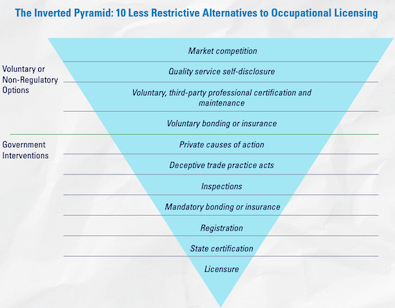
* A few of their ideas…
Moratorium on New Licenses:
• Pause the creation of any new occupational licenses in Illinois for 12 months.
• Limit new licenses to those situations where there is a demonstrated public safety or welfare interest that cannot be adequately addressed with alternatives to licensing.
Training and Education:
• Allow individuals seeking a license to be paid during their training.
• Offer apprenticeship programs in high schools.
• Reduce training/education requirements to only what is demonstrably necessary to protect health and safety. Consult with states having the lowest training days to determine if lower requirements are feasible. […]
Streamlining Processes and Reducing Barriers:
• Lower licensing fees and consider temporary grace periods for new businesses.
• Include numerous stakeholders and the public in the regulatory process to ensure fairness.
• Offer regulatory alternatives to licensure, such as registration, certification, apprenticeships or competency based on education, training, and/or experience.
Justice-Involved Licensees:
• Avoid blanket prohibitions on licensure for individuals with criminal records. Instead employ targeted standards to determine whether there is a relationship between (a) the underlying criminal conduct; and (b) the duties and responsibilities of the licensed occupation; which (c) would threaten public safety.
They also want any changes apply to local governments and preempt home rule.
Those are just some of their ideas. Click here for the rest.






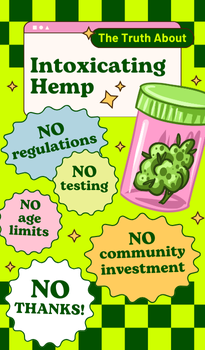
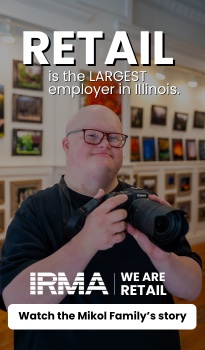
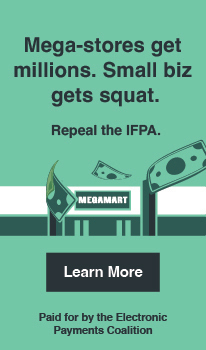



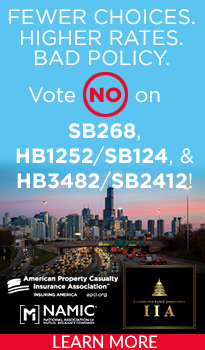






- Anyone Remember - Monday, Dec 16, 24 @ 12:56 pm:
“Lower licensing fees … .”
They should also use the “lock box” approach. No fund sweeps of licensing fees.
- DougChicago - Monday, Dec 16, 24 @ 1:14 pm:
Good luck when the association lobbyists start their work.
- Rich Miller - Monday, Dec 16, 24 @ 1:21 pm:
===Good luck when the association lobbyists start their work===
That’s why the governor and the legislative leaders need to become heavily involved in stuff like this. If it was easy, it woulda already been done. But bigger things have been done in this state, this can as well.
- very old soil - Monday, Dec 16, 24 @ 1:21 pm:
And the cosmetology schools.
- HSI - Monday, Dec 16, 24 @ 1:28 pm:
Always with the concern for the poor convicted felons. Honestly it gets tiresome.
- Rich Miller - Monday, Dec 16, 24 @ 1:34 pm:
===Honestly it gets tiresome===
If they’ve done their time, what’s your beef?
- ArchPundit - Monday, Dec 16, 24 @ 1:42 pm:
=== Honestly it gets tiresome.
You know what is even more tiresome? Recidivism.
- Give Us Barabbas - Monday, Dec 16, 24 @ 1:44 pm:
All the regulations and requirements now extant, are the response to some incidents or trends in the past, where irate voters said:”there ought to be a law.”
Before we remove a regulation or requirement we should check whether it’s become outdated and or irrelevant or anticompetitive.
Inconvenience to the regulator is not a qualification. Public health and safety is not something to “streamline” out of a profession.
In ancient times a guild or union would self-police their members and hold them accountable to set standards of ability. I would like to see that kind of accountability come back but late stage capitalism wouldn’t want it.
- thechampaignlife - Monday, Dec 16, 24 @ 3:42 pm:
===are the response to some incidents or trends in the past===
Often a hasty response to quell irate voters, or to appease lobbyists or CEOs - not a recipe for good governance.
===Before we remove a regulation or requirement we should check whether it’s become outdated and or irrelevant or anticompetitive.===
I would say the reverse should be true. Before we add a law that restricts liberties, we should check that it is absolutely necessary, that there are no other viable solutions to the problem, that it should be restricted indefinitely, and that it will actually accomplish its goal in the least restrictive way and with the least impact to all parties.
- Excitable Boy - Monday, Dec 16, 24 @ 4:27 pm:
- Always with the concern for the poor convicted felons. Honestly it gets tiresome. -
What gets tiresome are those who think every sentence needs to be a life sentence.
- PublicServant - Monday, Dec 16, 24 @ 6:36 pm:
My daughter completed a 2 year program for certification as a Surgical Technologist. She’s responsible for making sure the operating room instruments are sterile. Hospitals are bringing in non-certified techs that certified techs are required to train, and are then used interchangebly with those who’ve completed the two year certification process. The pseudo techs are brought in to hold down wages. This is a safelty issue. Would you want a tech who passed a certification test and a two year program responsible for maintaining operating room sterilization, or an uncertified “tech” responsible for your surgery?
- Reeves - Monday, Dec 16, 24 @ 10:41 pm:
it is laughable to think the reason people find their way to prison is because they were looking for a good job but were forced to turn to crime instead.